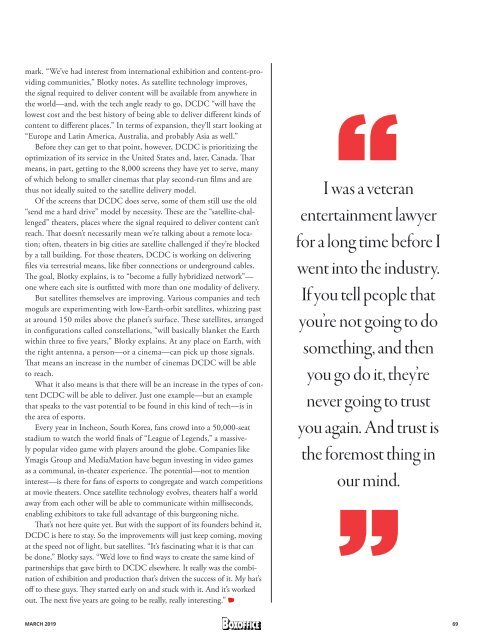Boxoffice - March 219
The Official Magazine of the National Association of Theatre Owners
The Official Magazine of the National Association of Theatre Owners
You also want an ePaper? Increase the reach of your titles
YUMPU automatically turns print PDFs into web optimized ePapers that Google loves.
mark. “We’ve had interest from international exhibition and content-providing<br />
communities,” Blotky notes. As satellite technology improves,<br />
the signal required to deliver content will be available from anywhere in<br />
the world—and, with the tech angle ready to go, DCDC “will have the<br />
lowest cost and the best history of being able to deliver different kinds of<br />
content to different places.” In terms of expansion, they’ll start looking at<br />
“Europe and Latin America, Australia, and probably Asia as well.”<br />
Before they can get to that point, however, DCDC is prioritizing the<br />
optimization of its service in the United States and, later, Canada. That<br />
means, in part, getting to the 8,000 screens they have yet to serve, many<br />
of which belong to smaller cinemas that play second-run films and are<br />
thus not ideally suited to the satellite delivery model.<br />
Of the screens that DCDC does serve, some of them still use the old<br />
“send me a hard drive” model by necessity. These are the “satellite-challenged”<br />
theaters, places where the signal required to deliver content can’t<br />
reach. That doesn’t necessarily mean we’re talking about a remote location;<br />
often, theaters in big cities are satellite challenged if they’re blocked<br />
by a tall building. For those theaters, DCDC is working on delivering<br />
files via terrestrial means, like fiber connections or underground cables.<br />
The goal, Blotky explains, is to “become a fully hybridized network”—<br />
one where each site is outfitted with more than one modality of delivery.<br />
But satellites themselves are improving. Various companies and tech<br />
moguls are experimenting with low-Earth-orbit satellites, whizzing past<br />
at around 150 miles above the planet’s surface. These satellites, arranged<br />
in configurations called constellations, “will basically blanket the Earth<br />
within three to five years,” Blotky explains. At any place on Earth, with<br />
the right antenna, a person—or a cinema—can pick up those signals.<br />
That means an increase in the number of cinemas DCDC will be able<br />
to reach.<br />
What it also means is that there will be an increase in the types of content<br />
DCDC will be able to deliver. Just one example—but an example<br />
that speaks to the vast potential to be found in this kind of tech—is in<br />
the area of esports.<br />
Every year in Incheon, South Korea, fans crowd into a 50,000-seat<br />
stadium to watch the world finals of “League of Legends,” a massively<br />
popular video game with players around the globe. Companies like<br />
Ymagis Group and MediaMation have begun investing in video games<br />
as a communal, in-theater experience. The potential—not to mention<br />
interest—is there for fans of esports to congregate and watch competitions<br />
at movie theaters. Once satellite technology evolves, theaters half a world<br />
away from each other will be able to communicate within milliseconds,<br />
enabling exhibitors to take full advantage of this burgeoning niche.<br />
That’s not here quite yet. But with the support of its founders behind it,<br />
DCDC is here to stay. So the improvements will just keep coming, moving<br />
at the speed not of light, but satellites. “It’s fascinating what it is that can<br />
be done,” Blotky says. “We’d love to find ways to create the same kind of<br />
partnerships that gave birth to DCDC elsewhere. It really was the combination<br />
of exhibition and production that’s driven the success of it. My hat’s<br />
off to these guys. They started early on and stuck with it. And it’s worked<br />
out. The next five years are going to be really, really interesting.”<br />
I was a veteran<br />
entertainment lawyer<br />
for a long time before I<br />
went into the industry.<br />
If you tell people that<br />
you’re not going to do<br />
something, and then<br />
you go do it, they’re<br />
never going to trust<br />
you again. And trust is<br />
the foremost thing in<br />
our mind.<br />
MARCH 2019<br />
69

















